Discover Sushant Pradhan Podcast
Sushant Pradhan Podcast

Sushant Pradhan Podcast
Author: Sushant Pradhan
Subscribed: 1,781Played: 27,531Subscribe
Share
© Sushant Pradhan
Description
Conversations spark ideas and ideas lead to actions that drive growth of the society. I believe long and unfiltered deep conversation is a lost art in this near perfectly presented world. And this is my attempt to have real conversations with real minds and present them to you. The goal is to learn from the greatest minds and take you on the journey.
Do subscribe if you feel this would add value to your life.
Do subscribe if you feel this would add value to your life.
488 Episodes
Reverse
In this episode, we sit down with Raju Bhetwaal, the Senior Vice President of Jagdamba Motors, who brings over three decades of experience in Nepal’s automobile sector. From the early days of petrol vehicles to today’s electric revolution, Raju shares deep insights into how the EV market in Nepal is evolving and what challenges still stand in its way. He discusses the rising demand for electric vehicles, the current state of EV charging stations, and the misconceptions people have about battery life, maintenance, and long-term costs. We explore why many still hesitate to switch from petrol and diesel vehicles to EVs, and how Nepal’s electricity supply and policies impact adoption. Raju also breaks down the EV-related provisions in Budget 2081, the role of NAIMA, and the journey behind Proton’s entry into the Nepali market through Jagdamba Motors. He shares his experiences in automobile innovation since the 1990s, his thoughts on sustainability, infrastructure, and EV technology improvements over time. The episode closes with valuable entrepreneurship advice for young innovators—focusing on consistency, humility, and innovation. If you’re curious about the future of EVs in Nepal, this episode is your full guide to the next automotive era. #EVNepal #RajuBhetwaal #JagdambaMotors #ElectricVehicleNepal #ProtonNepal #EVPodcast
GET CONNECTED WITH Raju Bhetwaal:
LinkedIn - https://in.linkedin.com/in/raju-bhetwal-79338b1b5
Discover the path to true happiness and deep self-connection with spiritual guru LP Bhanu Sharma in this enlightening video. Dive into transformative meditation techniques for beginners and learn how to start a daily practice that helps block distractions and enhances focus. Explore the rich difference between spirituality and religion, and why spiritual intelligence is essential in today's world. Understand biocentrism and its powerful role in personal growth, alongside the impact of mindful eating on spirituality. LP Bhanu Sharma also sheds light on the effects of comparison, isolation, and societal problems on our mental and spiritual well-being. This heartfelt conversation reveals how relationships act like mirrors, offering opportunities for healing and growth. Whether you’re seeking guidance on navigating a happy life or aiming to cultivate mindfulness and inner peace, this video offers practical advice and deep wisdom. Embrace the journey of connecting with yourself, improving your spiritual intelligence, and living a life full of happiness, mindfulness, and purpose. Perfect for those interested in meditation, spirituality, mindfulness, and holistic well-being, this video will inspire you to live more consciously and joyfully. Join LP Bhanu Sharma and transform your life today.
In this powerful conversation, Ratan Bhandari, a renowned Nepalese author and border expert, takes us deep into the untold history of Singha Durbar — Nepal’s most iconic political building. From his emotional reaction to the recent Singha Durbar fire to the hidden stories behind its construction and repeated destruction, Bhandari explores how this palace became the symbol of political power and tragedy. He shares detailed insights on why Singha Durbar was built, the land it stands on, and the mysterious circumstances surrounding its many fires — including the first fire incident, the Seto Durbar blaze, and conspiracies around the latest one. The discussion extends into Nepal’s broader history, including the Rana regime, Jang Bahadur Rana’s rise, the Kot Parva and Bhandarkhal massacre, and the roles of figures such as Chandara Shamsar and the Dixit family. This episode offers a rare blend of architecture, politics, and emotion, providing a historical perspective on how power, culture, and tragedy shaped modern Nepal. Watch till the end as Ratan Bhandari shares stories rarely told in the mainstream — from plane hijacks to border politics, and the enduring mystery of Singha Durbar’s fires. Keywords: Ratan Bhandari, Singha Durbar fire, Rana history, Nepal political history, Jang Bahadur Rana, Kot Parva, Bhandarkhal massacre, Seto Durbar
GET CONNECTED WITH Ratan Bhandari:
Facebook - https://www.facebook.com/ratanbhandariji?rdid=285g5vWpytk9aR8B&share_url=https%3A%2F%2Fwww.facebook.com%2Fshare%2F16YJnsi7r4%2F#
Youtube: https://youtube.com/@NepalArchivess?si=qmWGFt4jWDsPpsPz
What It Takes to Be a Musician in Nepal. In this episode, Bluesss (Suraj Shahi) — one of Nepal’s most creative and forward-thinking singer-songwriters — opens up about his latest album “Maya Ko Bhaasaa (Love Language)”, his influences growing up, and what it truly means to build a music career in Nepal. Bluesss shares his unique creative process, how he balances intuition and audience demand, and why he chooses to stay true to his own niche rather than chasing trends. The conversation dives deep into the state of Nepal’s pop culture industry, the role of technology and autotune, and practical advice for beginners in music production — from the right software to the mindset required to grow. He also talks about creative blocks, collaborations, and the goal of becoming a full-time performing artist. From Durgesh Thapa’s influence on the scene to the broader music business landscape in Nepal, Bluesss offers an honest and inspiring look into the artist’s life. Keywords: Bluesss, Suraj Shahi, Maya Ko Bhaasaa, Love Language, Nepali music industry, music production Nepal, autotune explained, pop culture Nepal, creative block, performing artist Nepal, Nepali singer songwriter, how to make music Nepal, Nepali pop artist.
GET CONNECTED WITH Bluesss:
Instagram - https://www.instagram.com/youngbluesss/
Facebook - https://www.facebook.com/bluesss01/
Spotify - https://open.spotify.com/artist/4Vg08hmIKaUU2iQeJ6LCVv
Tidal - https://tidal.com/artist/10986075
Amazon Music - https://music.amazon.com/artists/B07NPXZWLK/bluesss
YouTube - https://www.youtube.com/@Bluesss
Apple Music - https://music.apple.com/np/artist/bluesss/1453021317
Soundcloud - https://soundcloud.com/suraj-blues
In this powerful conversation, Dipak Gyawali, John David Seddon, and Jason Baidya explore how today’s global crises—from *Gaza and Ukraine to Sudan and Iran—*reflect a deeper collapse of the rules-based world order. John Seddon, author of Nepal in Crisis, shares his global perspective on settler colonialism, the Balfour Declaration, and the failure of ceasefire diplomacy. The trio dives into the UN Security Council veto problem, Western economic decline, and the geopolitical tensions shaping Europe and Asia. Gyawali and Baidya bring the discussion closer to home, analyzing Nepal’s economy, leadership, Gen Z activism, and the growing monarchy debate. From the UK’s housing and healthcare collapse to Iran’s nuclear threat and the immigration crisis, the podcast paints a vivid picture of a world struggling for stability. The conversation ends on a sharp reflection about Nepal’s role in a changing global order, urging young Nepalis to rethink leadership, democracy, and national identity. Keywords: Gaza conflict, Israel Palestine war, John David Seddon, Dipak Gyawali, Jason Baidya, UN Security Council veto, World order collapse, Nepal economy, Gen Z Nepal, Democracy crisis, Iran nuclear, Immigration crisis, Global politics, South Asia geopolitics, Monarchy debate Nepal.
GET CONNECTED WITH :
Dipak Gyawali Twitter - https://x.com/dipak_gyawali
Jason Baidya Twitter - https://x.com/JasonDBaidya
Facebook - https://www.facebook.com/jason.baidya.5/
In this powerful conversation, Prof. Achyut Wagle, one of Nepal’s most respected economists and academics, unpacks the deep-rooted issues holding Nepal back — from corruption and weak leadership to education, unemployment, and governance. Known for his sharp insights on economics and public policy, Prof. Wagle explains how Nepal’s Gen Z revolution reflects a broader demand for accountability, economic reform, and transparency. The discussion covers corruption control mechanisms, the impact of the shadow economy, and how the core economic agenda has been ignored in all seven versions of Nepal’s constitution. Prof. Wagle also analyzes the quality of education, the reality of Nepali students abroad, and the challenges in creating meaningful employment at home. Later, the conversation moves to geopolitics, foreign policy, and media responsibility, ending with Prof. Wagle’s insight on how Nepal moved from 2% to 7.8% growth according to the World Bank, and what it will take to sustain that progress. 📌 Keywords: Nepal economy, corruption in Nepal, Achyut Wagle, Gen Z revolution, economic reform, leadership crisis, education quality, foreign students, shadow economy, demonetization, media, and growth. GET CONNECTED WITH Prof. Achyut Wagle: LinkedIn - https://np.linkedin.com/in/achyut-wagle-a9b1537a Twitter - https://x.com/drachyutwagle?lang=en
In this episode, we sit down with Dr. Rajan Suwal, one of Nepal’s leading structural engineers, academics, and current President of the Structural Engineers’ Association of Nepal (SEANep). As an Associate Professor at the Institute of Engineering (IOE), Pulchowk Campus, Dr. Suwal shares invaluable insights into building safety, fire damage repair, and retrofitting techniques essential for Nepal’s urban future. He begins by analyzing the recent fire damage and explains how houses are inspected and repaired after such incidents. Dr. Suwal dives into the technical aspects of retrofitting—especially the process of repairing Singha Durbar and Parliament after the Gen-Z protest fires. The conversation covers construction grade selection (such as whether 25 grade is suitable for commercial or residential buildings) and how house grades and materials affect insurance claims. Furthermore, he breaks down the fire temperature data, the damage assessment process, and the lessons Nepal must learn from the damage to the Hilton Hotel during the protests. The discussion expands to earthquake-resistant design principles and building maintenance practices that can save both lives and infrastructure in the long run. If you’re an engineer, architecture student, homeowner, or policymaker, this episode is packed with expert insights on fire safety, retrofitting, and structural resilience in Nepal.
GET CONNECTED WITH Dr. Rajan Suwal:
Facebook - https://www.facebook.com/rajan.suwal.1/?_rdr
LinkedIn - https://www.linkedin.com/in/rajan-suwal-5aa9b434/?originalSubdomain=np
Google Scholar - https://scholar.google.com/citations?user=d3nFYBsAAAAJ&hl=en
In this thought-provoking episode, Mukti Aryal, a financial economist and investment banker with an MBA and MS in Finance from Simon Business School (University of Rochester, USA), joins Dr. Niraj Poudyal, a senior researcher and economist with a PhD from Virginia Tech University, to discuss the real-world dynamics of capitalism, market liberalization, and economic transformation in Nepal and beyond. Mukti Aryal brings decades of experience in investment banking, mutual funds, asset management, and portfolio valuation, while Dr. Poudyal offers deep insights into policy design, economic inclusion, and education system reforms based on his work with organizations like UNICEF, USAID, and Kathmandu University across Asia and Africa. Together, they unpack how capitalism functions in developing economies, the role of government and taxation, and whether Nepal’s economy can balance growth with fairness and opportunity.
GET CONNECTED WITH Dr. Niraj Poudyal:
Linkedin: https://np.linkedin.com/in/niraj-poudyal-phd-12b85b159
Discover the incredible world of Lion’s Mane mushrooms in Nepal as expert mushroom huntress Ruksana and Soma Mushrooms business owner Raj unlock the secrets behind this brain-boosting fungi. Explore Nepal’s rich mushroom biodiversity, from wild edible species to the medicinal and psychedelic properties of Lion’s Mane and Cordyceps. Learn about the aftermath of cordyceps harvesting, traditional mushroom culture in Nepal, and the growing potential for commercial mushroom cultivation. This video dives deep into the positive uses of psychedelic mushrooms like psilocybin, the eco-friendly future of plastic-eating fungi, and cutting-edge mycelium research transforming Nepal’s mushroom industry. Gain insights into the commercial benefits and research surrounding Lion’s Mane and psilocybin mushrooms in Nepal, alongside a discussion on Yarsagumba, the Himalayan gold of mushrooms. Join our guests Soma and Ruksana as they share expertise on mushroom foraging, cultivation, and how Nepal can capitalize on its unique fungi biodiversity. Whether you’re interested in mental wellness, environmental solutions, or Nepal’s mushroom business prospects, this video delivers expert perspectives and trending topics for 2025. Subscribe for more on mushroom culture, research, and commercialization in Nepal's fascinating fungal world
GET CONNECTED WITH Ruksana and Soma:
Instagram: https://www.instagram.com/mushroomsofnepal/
Instagram: https://www.instagram.com/somamushrooms.np/
In this in-depth conversation, Rehan Raj Dangal, a law graduate, cinematographer, and Gen-Z activist, breaks down Nepal’s complex socio-political reality — from the Gen Z protest to foreign interference shaping the country’s future. He reveals what really happened behind the scenes during the Gen Z movement, exposing how Nepal’s political system, judiciary, and economy are influenced by external forces. Rehan also discusses how leaders like Sushila Karki were chosen, why youth movements matter, and how foreign powers manipulate Nepal’s decisions through policies like MCC, BRI, and global alliances. The discussion dives deep into Nepal’s treaties, governance inefficiencies, corruption in bureaucracy, and the struggles of modern democracy. From education failures to media manipulation, constitutional weaknesses, and social division, Rehan Raj Dangal’s insights offer an unfiltered look at Nepal’s identity crisis in the 21st century. This podcast is a must-watch for anyone interested in Nepal’s politics, Gen Z protests, foreign influence, and national sovereignty. #NepalPolitics #RehanRajDangal #GenZProtest #NepalGeopolitics #BRI #MCC #CorruptionInNepal #ForeignInfluence #NepalYouth #SystemChange #NepalNews #NepalPodcast
GET CONNECTED WITH Rehan Raj Dangal:
Facebook - https://www.facebook.com/rehan.raj.dangal
Instagram - https://www.instagram.com/rehanrajdangal/?hl=ne
YouTube - https://www.youtube.com/@CODERED-codered
LinkedIn - https://np.linkedin.com/in/rehan-raj-dangal-14a892220
Lawyer, writer, and activist Swagat Nepal joins this thought-provoking episode to dissect Nepal's political system, constitution, and corruption. From the judiciary movement and Gen Z protests to geopolitical threats involving China, India, and the USA, this conversation explores the forces shaping Nepal's fragile democracy. Swagat Nepal explains the differences between constitutional amendment, repeal, and auction, the right to recall and reject voting system, and whether Nepal's youth are against monarchy. He also discusses the citizenship crisis, including the challenges of granting citizenship through the mother's name, and shares insight into population management and foreign influence in Nepal's governance. The discussion extends to MCC, corruption in Nepal's judiciary, and the religious aspect in politics-unpacking how constitutional organs and social justice movements can rebuild national integrity. If you're interested in Nepal's constitution, governance, youth activism, and geopolitics, this episode offers deep, unfiltered analysis by Swagat Nepal, one of Nepal's most vocal voices for reform and accountability.
GET CONNECTED WITH: Swagat Nepal
Facebook: https://www.facebook.com/swagatnepalofficial/
Instagram: https://www.instagram.com/swagat.nepal/?hl=en
Sanish Arts on Nepali Creativity, Street Art & Building a Global Voice. Sanish Arts, one of Nepal’s most unique contemporary and street artists, joins the podcast to share his creative journey and the untold story of Nepal’s underground art scene. From the story behind Face Cards to the founding of PSD (Public Space Division), Sanish talks about how art can become a voice for change, community, and culture in Nepal. In this conversation, Sanish reflects on his early inspirations, his passion for street art, and how exploring Nepal’s cities shaped his creative expression. He takes us through the rise of graffiti, murals, and the DIY movement in Dharan and Kathmandu, the roots of the punk scene, and how festivals like Hill Fest became a cultural hub for underground music and art. The discussion also dives into the international side of art — Sanish shares insights from Germany’s vibrant art scene, how contemporary artists in Nepal are finding their voice, and why collaboration with brands is both a challenge and an opportunity. From skating culture to social media promotion, he explains why artists must push themselves to showcase their work and create impact. We also explore the history and influence of global icons like Shepard Fairey (Obey) on street art culture and what the future looks like for Nepali artists navigating creativity, commercialization, and activism. This episode is a deep dive into Nepal’s street art, graffiti, punk scene, DIY culture, and visual arts, offering inspiration for artists, creators, and anyone passionate about cultural expression.
GET CONNECTED WITH Sanish Kumar Shakya:
Instagram: https://www.instagram.com/saikush.psd?igsh=ZTMzb3p3NjY5cjQ1
Behance: https://www.behance.net/sanishshakya?fbclid=PAb21jcANIUbtleHRuA2FlbQIxMQABp3RkEO0ltVc9ZkDZNbgK7ru2-WWxYwi8nntq7X3ZbvGRIEBhNFre4sCRF5O__aem_yWPNrlw8pd9bw-dGxv6y4Q
Matriarchal Rule and The Queens' Power in Ancient Civilizations. This episode of the Mesopotamian Civilization series, featuring guest expert Yadav Devkota, explores the fascinating origins of slavery and prostitution in ancient Sumerian society, revealing how these social structures shaped early human civilization. Dive deep into Mesopotamia’s complex cultural history, including the unique Mashto and Dhami cultures of Khas and their intriguing parallels with Sumerian practices. Discover why the concept of pure DNA and isolated haplogroups is a myth, based on genetic variations from ancient populations. The episode also sheds light on the powerful matriarchal rule that once dominated Mesopotamian civilizations and how it was gradually displaced by patriarchy, changing the course of history. Learn about the role of female rulers and the tradition where the one who marries the queen becomes king, linking these ancient beliefs to cultural practices like the Ajimas of Kathmandu. This podcast dives into how beer brewing originated from the Sumerians and unpacks the early development of religion and the concept of God in human history. Perfect for history enthusiasts and those interested in ancient civilizations, this detailed discussion unwraps the roots of Mesopotamian identity, culture, gender dynamics, and social systems, providing a comprehensive understanding of one of the world’s earliest civilizations.
How Humans Shaped History: From Migration to Civilization Collaps. In this thought-provoking podcast, historian and researcher Yadav Devkota takes us on a journey through the origins of human civilization and the milestones that shaped our shared history. The conversation begins with how humans first migrated into South Asia and the surprising story of four different human species that once lived across Asia and Europe. Yadav Devkota then unpacks the history of animal domestication, explaining how our oldest companions transformed survival and society. The discussion moves into the rise of ancient civilizations, exploring how they molded global culture, developed systems of knowledge, and laid the foundation for traditions and innovations still relevant today. Yet alongside their achievements, we also learn why these civilizations eventually collapsed, revealing critical lessons about resilience, governance, and survival. Finally, we dive into Mesopotamian brilliance—how humans first tracked time, built mathematical systems, and laid down the earliest laws that changed the course of human progress. This podcast is more than a history lesson; it’s a journey into the human story, where migration, innovation, and civilization shaped the destiny of our species. If you are curious about anthropology, ancient culture, or the origins of human society, Yadav Devkota’s insights will leave you with a deeper understanding of how the past continues to shape our present and future.
Bharat Dahal on Nepal’s Geopolitics, Gen Z Protest & Future Politics. Bharat Dahal, a renowned political analyst and former Maoist leader, joins this podcast to deliver powerful insights into Nepal’s current geopolitical and political situation. In this in-depth conversation, he breaks down the complexities of Nepal’s geopolitics, the Gen Z protest, foreign interference, and the country’s uncertain future. In the first half, Bharat Dahal explains how the USA, Russia, India, and China are shaping South Asia through proxy wars, economic tactics, and hidden strategies. He highlights the Bangladesh airport incident, Indian media propaganda, dollar power, and shifting global alliances that directly impact Nepal. Dahal also sheds light on the foreign intervention in Nepal’s Gen Z protest, a movement that brought youth to the streets demanding change. In the second half, the discussion turns to Nepal’s internal crisis: the call for a directly elected PM, government dissolvement, NGO and INGO involvement, and the controversial snipers during the Gen Z protest. He also speaks on Sushila Karki as a possible interim PM, the role of Tibet refugees, and his endorsement of Harka Sanpang. This episode is a must-watch for anyone interested in Nepal’s geopolitics, foreign influence, and the voice of Gen Z youth as the nation faces one of its most defining moments.
GET CONNECTED WITH Bharat Dahal:
Youtube: https://www.youtube.com/bharatdahal
FaceBook: https://www.facebook.com/bharat.dahal.121/?locale=ne_NP
Live Witness of Nepal’s Gen Z Protest Speaks Out. In this powerful episode, Rishi Jung Thapa, a live witness of Nepal’s Gen Z Protest, shares his first-hand account of what really happened on the ground. From the moment he learned about the protest to experiencing the police crackdown, Rishi explains the shortage of ambulances, chaos in hospitals, and the struggles protesters faced. He sheds light on how protesters motivated each other despite police attacks, the allegations of ambulances being targeted, and the overall medical emergency that unfolded in Kathmandu. Rishi Jung Thapa also reflects on the post-protest atmosphere, the voices of protesters about Nepal’s current situation, and shares his own meaningful words for Nepal’s youth and future. This exclusive testimony gives an inside look at the realities of Nepal’s Gen Z protest, the failures of state response, and the resilience of young protesters demanding change. A must-watch for anyone following Nepal’s politics, youth movements, and protest history.
GET CONNECTED WITH Rishi Jung Thapa:
Facebook: https://www.facebook.com/Hrishithapa16
Instagram: https://www.instagram.com/risshi.jung
Chiran Jung Thapa: How Nepal Can Fix Its Security & Geopolitical Issues. In this podcast, Chiran Jung Thapa, one of Nepal’s leading security analysts and regional advisors, shares his deep insights on the state of Nepal’s security system, the role of the Army and Police, and the geopolitical challenges Nepal faces today. From analyzing the current situation of Nepal to discussing reforms needed for the Nepal Police and the future role of the Nepal Army, Thapa provides both critical analysis and practical solutions. The conversation covers police gun firing conspiracies, corruption in promotions, digital forensics, and the aftermath of Gen Z protests. Chiran Jung Thapa also highlights why Nepal’s security system struggles under pressure, the importance of infrastructure security, and where Nepal stands in terms of global security and regional geopolitics. We also explore why the Nepal Army has no interest in ruling the country, what reforms are urgently needed in the Nepal Police, and how social media plays a role in mobilization and solutions during national crises. This is a must-watch for anyone interested in Nepal’s politics, security, and future direction.
GET CONNECTED WITH Mr. Chiran Jung Thapa:
Linkedin: https://www.linkedin.com/in/chiran-jung-thapa-3ba611/
X: https://x.com/chiranjungthapa
How Kathmandu Grew Wrong & What We Can Learn From History. In this podcast, we sit down with Padma Sundar Joshi, an expert in urban planning and heritage conservation, to explore the history and challenges of Kathmandu’s urbanization. The conversation begins with the history of Newa settlements and how they were self-sufficient, designed around rivers, and shaped community life. Joshi explains why Kathmandu floods today, the failure of land use planning, and how projects like the Ring Road and decisions by political figures accelerated unplanned growth. We dive into the population crisis, asking if decentralization is the solution, and uncover the role of temples and jatras in building community ties. Joshi highlights Kathmandu’s biggest urban challenge: mobility. He critiques failed infrastructure like the Gwarko flyover, and suggests ways to improve public transport. The podcast also touches on Joshi’s book Hiti Pranali, the importance of hitis in Patan, and how to revive them. We discuss whether Kathmandu’s soil is crumbling, why banning deep boring is necessary, and the troubled history of the Melamchi Project. Joshi also shares insights into Newa earthquake-resistant architecture, the lessons of the 2015 earthquake, and how retrofitting and traditional knowledge can protect future generations. This episode is a must-watch for anyone concerned about Kathmandu’s urban crisis, water scarcity, and earthquake preparedness.
Prof. Yubaraj Sangroula on Nepal’s Geopolitics, Constitution & Future. In this in-depth podcast, we sit down with Prof. Yubaraj Sangroula, former Attorney General of Nepal and a respected legal and geopolitical analyst, to discuss the complex challenges Nepal faces in politics, governance, and foreign policy. Prof. Sangroula begins by analyzing Nepal’s geopolitics, explaining how the country’s strategic position between global powers has become increasingly fragile. He dives into the impact of foreign alliances, MCC, and SPP, and why Nepal’s geopolitical strength has weakened in recent years. The conversation also explores Nepal’s constitution and democracy, from the dangers of superseding or repealing the constitution to the implications of parliament dissolutions. Prof. Sangroula highlights the risks posed by unchecked regimes, corruption, and the misuse of state power. We also address the rise of Gen Z protests, the influence of youth movements, and the frustration behind shootings and demonstrations. The discussion includes voting rights for Nepalis abroad, corruption and social media censorship, and alternative political solutions for the presidency and governance. Finally, Prof. Sangroula reflects on Nepal’s foreign policy choices, America’s renewed interest in Afghanistan, and the importance of strengthening Nepal’s sovereignty through smarter geopolitical strategies. This podcast is essential for anyone who wants to understand Nepal’s geopolitics, constitution, democracy, youth movements, and political future.
Get Connected With Prof. Yubaraj Sangroula:
FaceBook: https://www.facebook.com/dr.yubarajsangroula/
Linkedin: https://np.linkedin.com/in/yubaraj-sangroula-0bb807165
Economic Loss After GenZ Protest | Nepal’s Financial Challenges. Governer Biswo Nath Paudel, one of Nepal’s leading economists, joins us for an in-depth discussion on the current situation of Nepal Rastra Bank, the country’s financial institutions, and how recent GenZ protests have impacted the Nepalese economy. In this episode, Dr. Paudel reflects on key incidents involving the Rastra Bank, the economic loss after protests, and how foreign direct investment (FDI) and entrepreneurship in Nepal are now at risk due to unwanted rules and policies. We also dive deep into the foreign loans Nepal relies on, challenges in the share market, and the growing debate around economic downturn risks. Dr. Paudel explains why Nepal’s economic system is hard to develop, and highlights the increasing number of IT companies being registered while addressing whether government policy matters in economic growth. This podcast is a must-watch for anyone interested in the future of Nepal’s economy, the role of Nepal Rastra Bank, and insights into how foreign loans, FDI, and entrepreneurship will shape Nepal’s financial future. Don’t miss this engaging discussion with Dr. Biswo Nath Paudel on the challenges and opportunities facing Nepal’s developing economy.
GET CONNECTED WITH Dr. Biswo Nath Poudel:
Facebook: https://www.facebook.com/biswo.poudel.7
Linkedin: https://www.linkedin.com/in/biswo-poudel-048aa94/?originalSubdomain=np



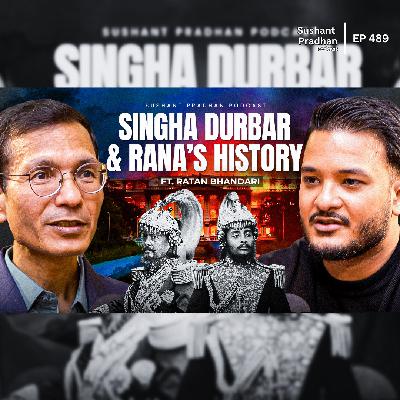



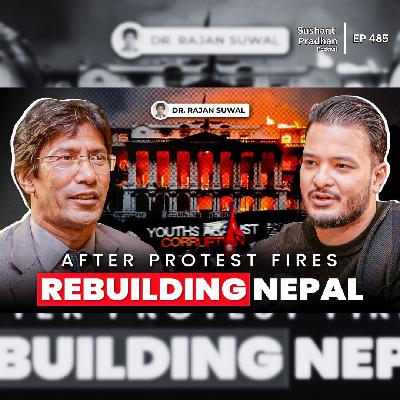

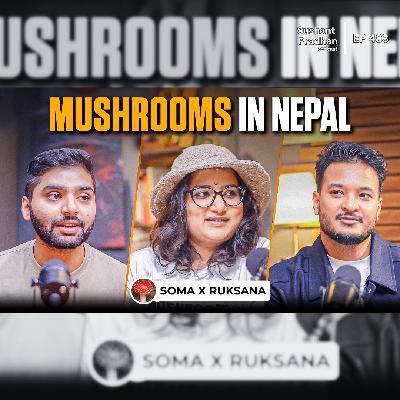





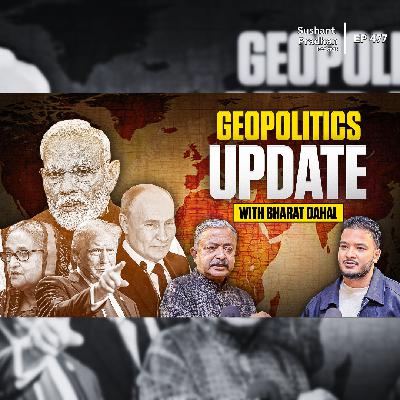
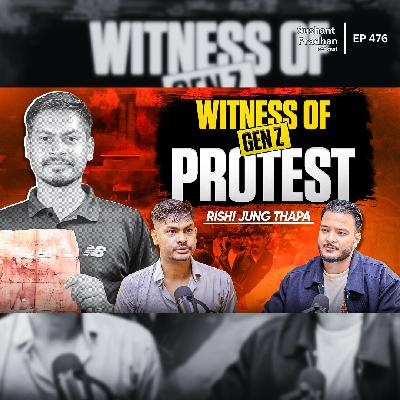
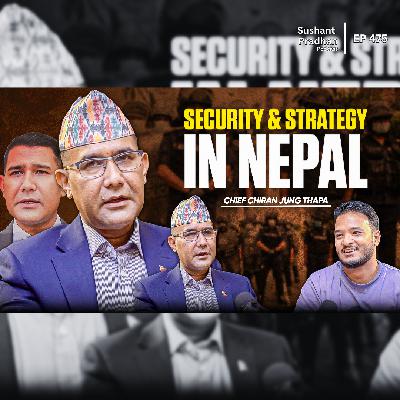
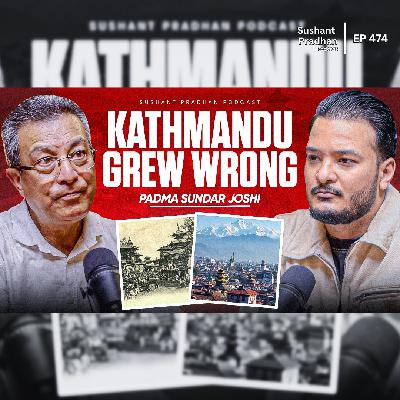
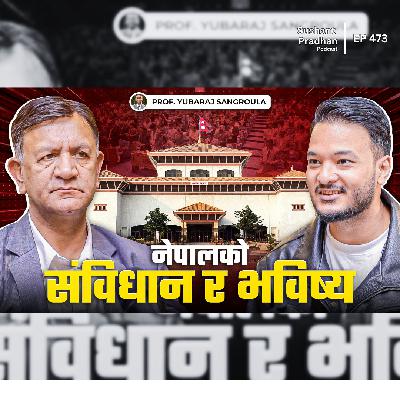
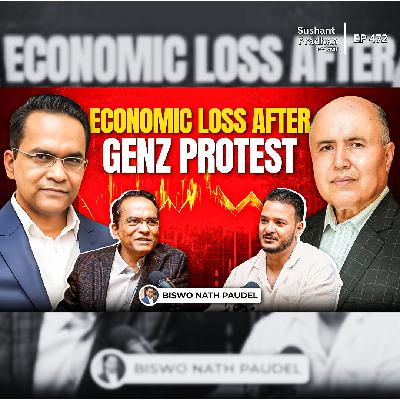



why is the word "covid" being beeped?